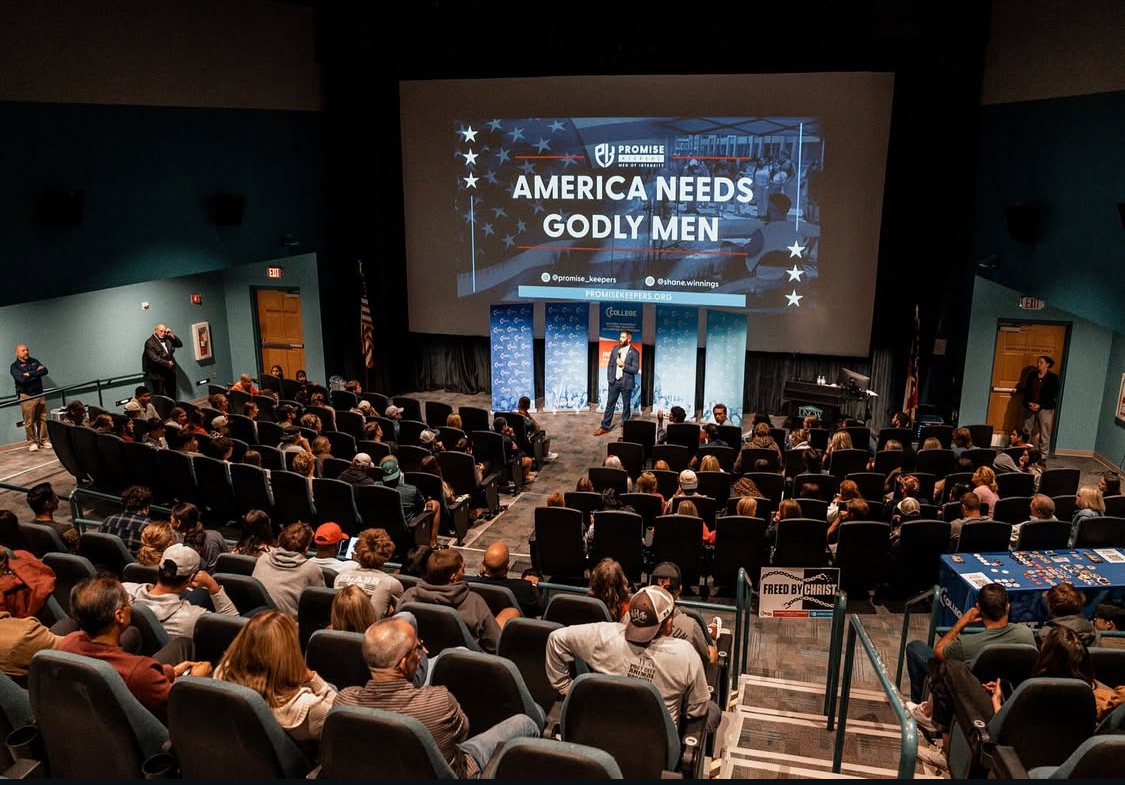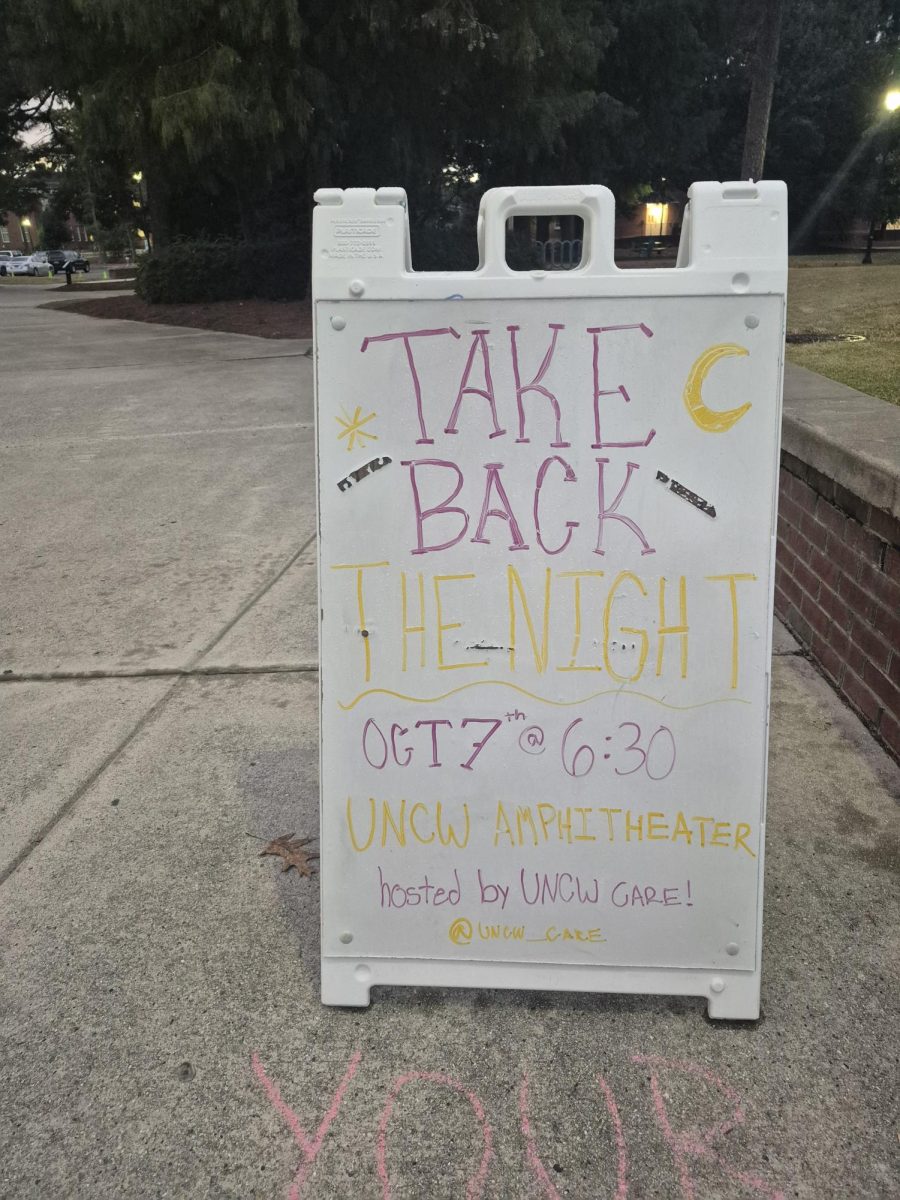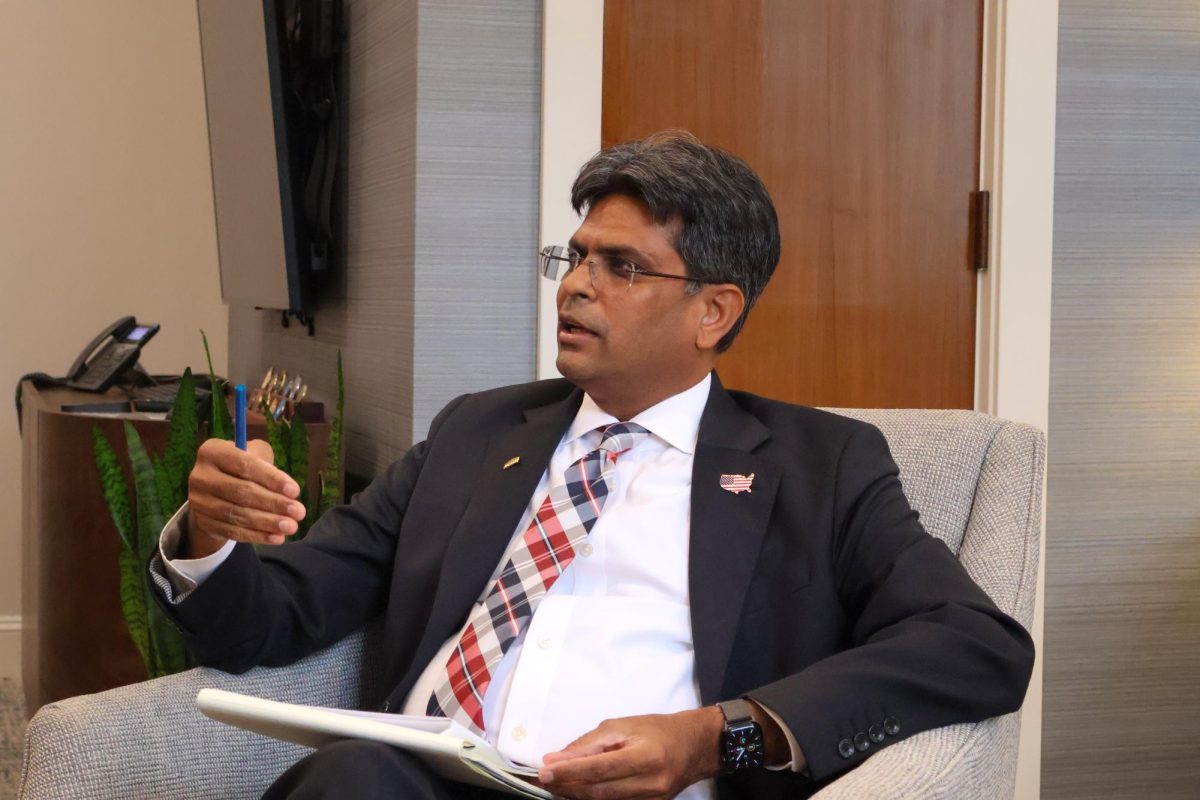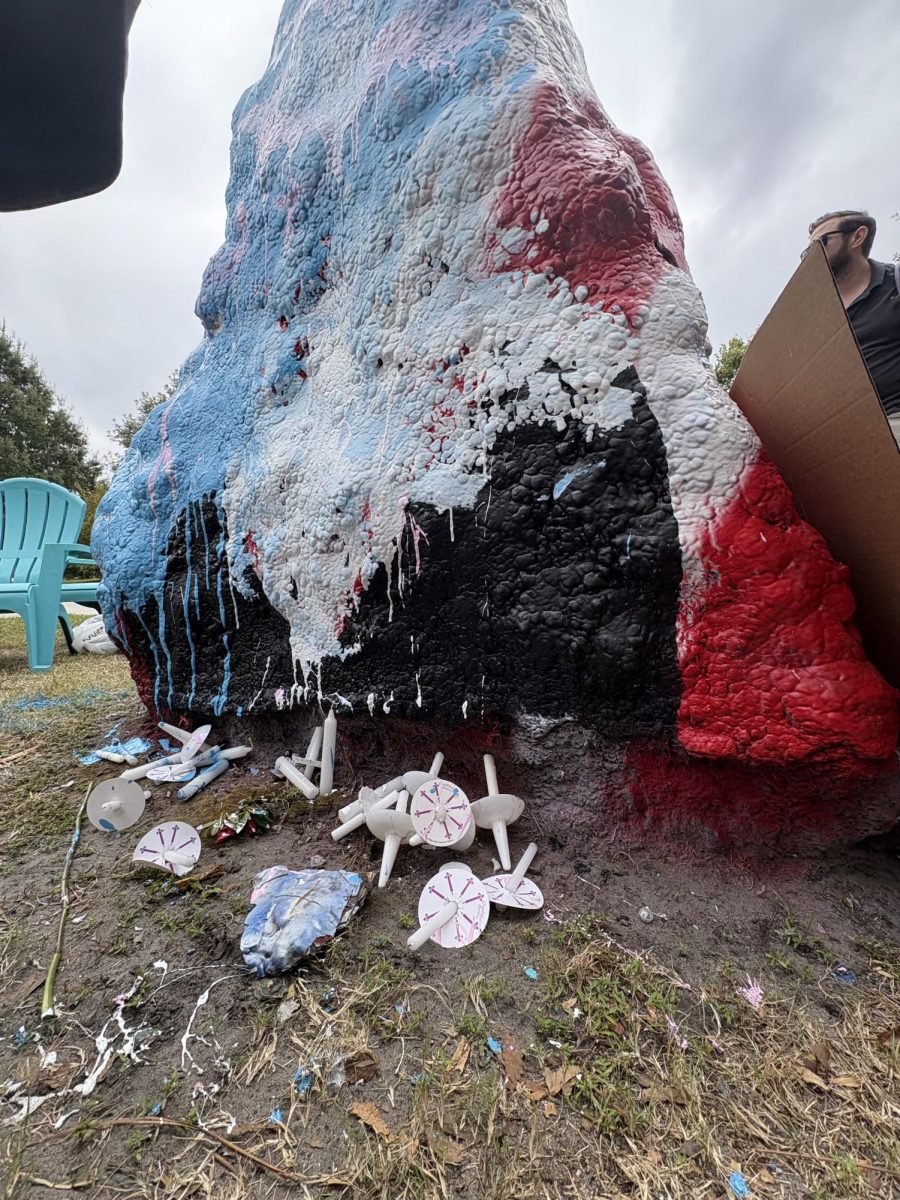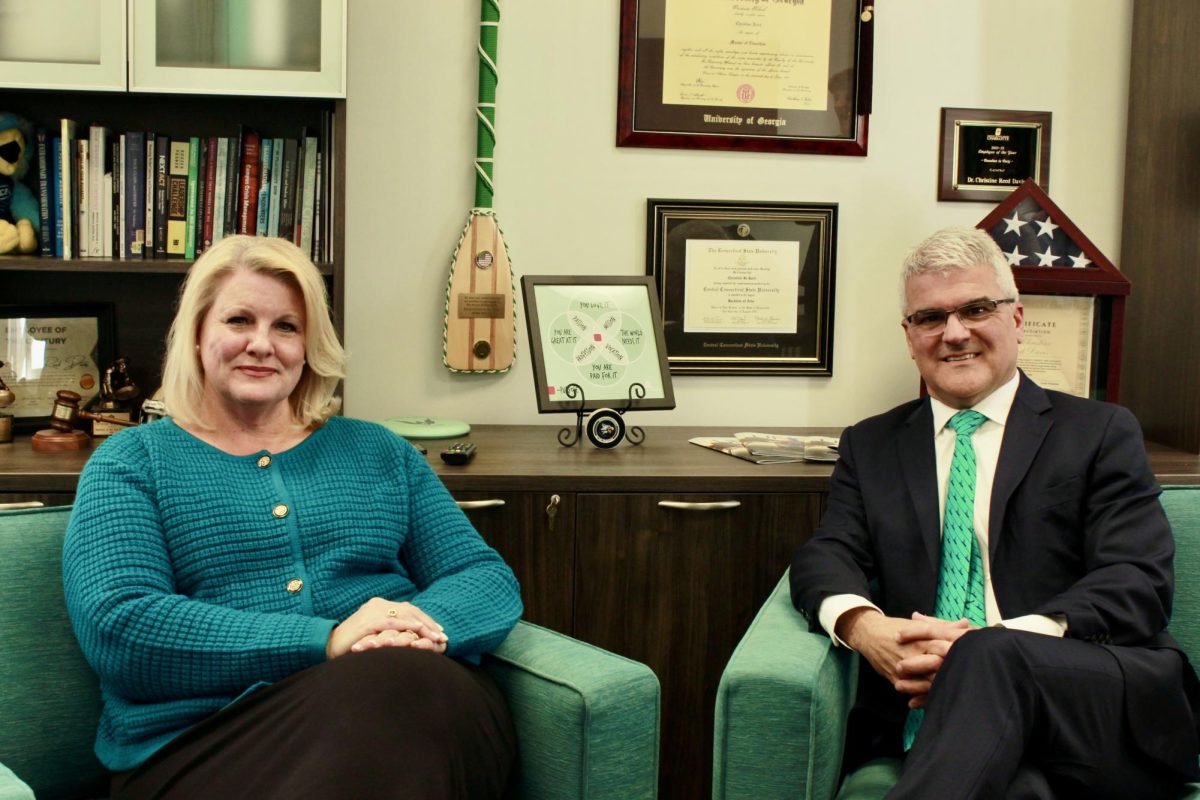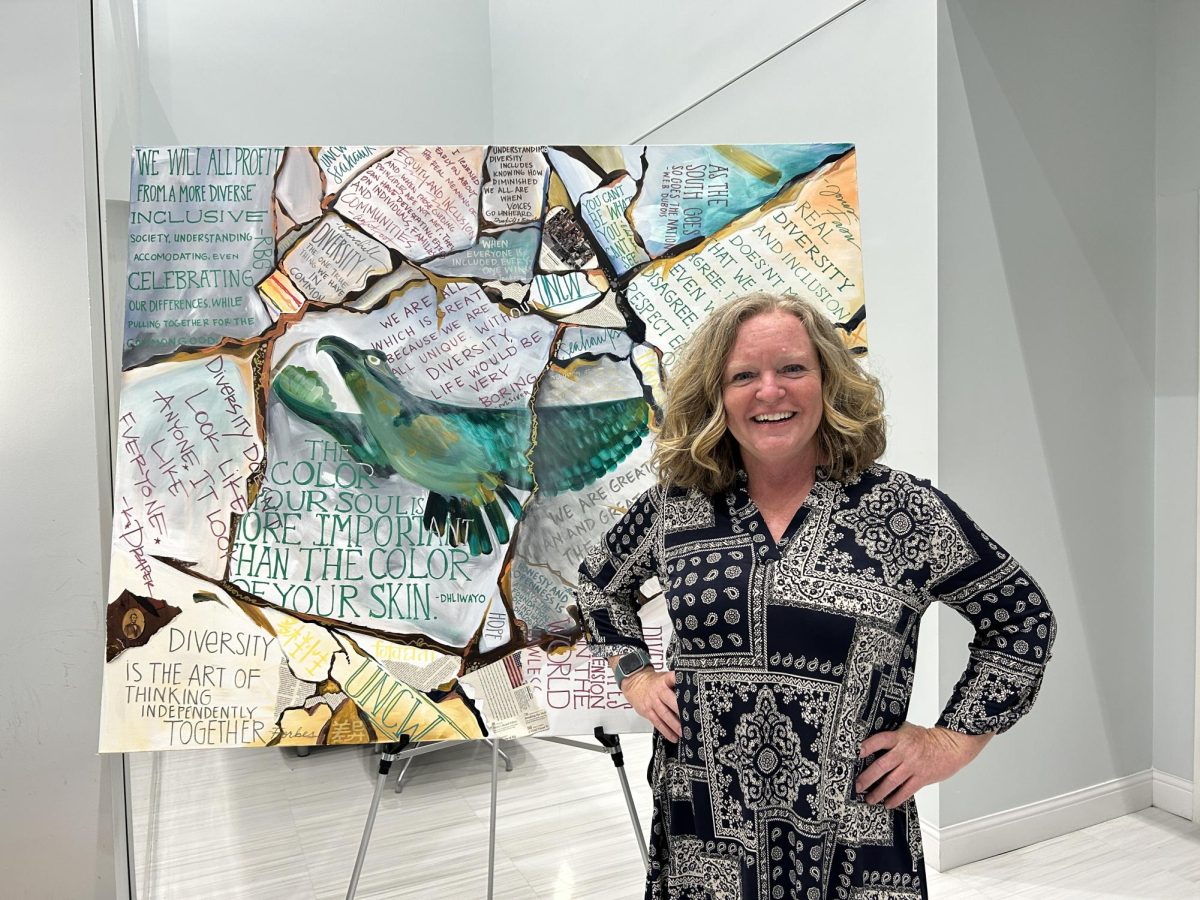Shane Winnings, a popular conservative social media influencer, preacher and CEO of Promise Keepers, was invited to campus by UNCW’s chapter of Turning Point USA on Wednesday, Oct. 15. Winnings’ visit was part of his “America Needs Godly Men” college tour series in which he highlights the shortcomings of American society and how he believes they can be fixed with Christianity.
Winnings opened his speech with a prayer and followed with a segment about how to “be a man,” which set the stage for the rest of the hour in which he discussed his views on LGBTQ+ marriage, abortion, masculinity and femininity, Christianity and the state of our country today. He had the tour’s tagline, “America Needs Godly Men,” behind him throughout his speech.
“The reason that this tour is called ‘America Needs Godly Men’ is because I will blame the overwhelming majority of the issues in this nation on us as men; that we have not stepped up and led like we were appointed by God to do,” Winnings began. “We have allowed a Marxist ideology to come in and break up our families. We have allowed a perverted feminist movement to silence our voices and elevate women into a perverted spot where they do not need to be.”
Winnings consistently emphasized the message that God comes before politics and should be the main trajectory of a person’s life. “[…] I believe that we don’t just need good men, we don’t need conservative men, we don’t need tough men, we don’t need strong men. We need Godly men. Godly men will do what’s right, no matter the cost,” he said.
During the speech, he also condemned LGBTQ+ marriage and transgenderism. “I think gay marriage should be outlawed in this country. Now, I’m not saying that gay people should be outlawed — being gay should be outlawed. I didn’t say that, because you have the right to pursue life, liberty and happiness,” he said. He proceeded to explain that if you live contrary to God’s way, he believes you will pay the consequences.
“We are the most anxious, depressed, suicidal, drug-addicted generation in history. I think we need to go backwards, not forwards,” Winnings said.
Winnings also emphasized the problem of fatherlessness and crime in the Black community. “They don’t have dads, so they go try to find out what it means to be a man,” he said. “I wish that they could get this talk, because when I was a cop south of Seattle and I was picking up teens off the street who were riddled with bullet holes and dead at 14 years old, there were no dads coming to identify the body. It was moms.”
This led into Winnings addressing feminism, with one moment in particular stirring some members of the audience. “[Culture] promoted this wicked ideology of feminism, which says that you can be free,” he said. “[…] Look at women back in the 50s. Most of them look pretty happy.” At this point, one woman verbally objected — “Wrong” — and Winnings told her to “shut [her] mouth. That’s rude.”
Winnings carried on to say that he believed the “perverted feminist ideology convinced the working woman that she was a slave and then went and made her a slave to the working man.” He said that the picture of feminism is bigger — that the higher-ups didn’t want mothers to be home so that it was easier for the public school system to “indoctrinate” them.
“Yes, it’s great to work, and yes, it’s good to pursue the things that you’re interested in, but I believe if you ask most women who haven’t been brainwashed by social media and Marxist ideology, they have a deep desire to be a wife, to be a mother, to have a family… to actually, like, embody feminine qualities,” Winnings also said during the feminism segment.
After his speech was given, he led into a segment where audience members could debate him or ask him questions. This lasted an hour, and afterwards Winnings held a meet and greet outside, during which he took photos with fans and talked to attendees.
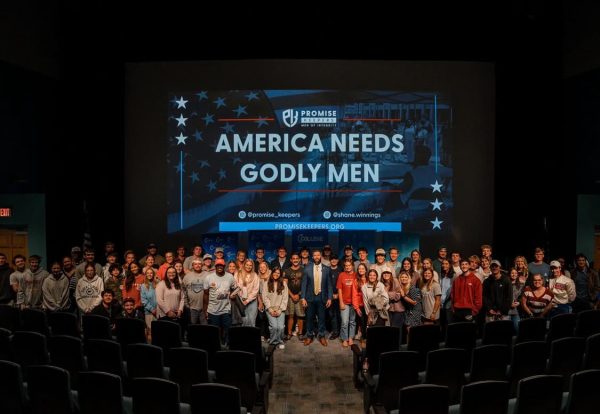
Although the seats were primarily filled with Turning Point USA members and conservative-leaning individuals, there were students and community members from opposite sides of the political spectrum in attendance as well.
“It’s very polarized, the audience itself. A lot of people hate his views, a lot of people agree with them wholeheartedly, so it was interesting to be there,” said an anonymous student.
Winnings’ visit comes at a time when political tension on campus has been high following the killing of Charlie Kirk, the prominent CEO of Turning Point USA. Some students are trying to figure out how to bridge the gap between one another.
“I think both sides can have thin skin at times, and I think it’s a shame,” the student followed. “I almost wish that we would all just think, like, well ‘those are just words. Sticks and stones may break my bones, but words will never hurt me.’ I would like us to get to a level of discourse where we can truly live that in action.”
“I feel like, because people are so afraid to offend somebody or get in trouble with the faculty or staff, you know, for saying something discriminatory, we can’t make jokes anymore. […] and I want us to be able to make jokes,” he said.
“Like, I hung out with the protestors tonight, I hung out with the supporters tonight, and everybody’s like free within each other, but they’re not free to joke around with their opponent. Like, that’s something we need to work on,” the student added.
He believes that the key to handling political discourse among students is to listen and speak freely, similar to what Winnings preached during his visit. “If we can’t take it, we need to [have it in the social hive mind] like okay, if I can’t handle dialogue with this person I’m just gonna remove myself and then come back if I’m more calm.”
One individual named Arlo, an incoming freshman, disagrees with most of Winnings’ points, but can find some common ground with his criticism of excessive prescription drugs used for mental health purposes. “[…] with the idea of pharmaceuticals being predatory towards people with mental illnesses, I do kind of agree with that,” they said.
Arlo was one of the few students who opposed Winnings’ yet stood up to ask a question. “I mean, even being in that room surrounded by so many people, that made me super panty, and if I wasn’t on that medication, I would, you know, be freaking out,” they said. “But at the same time, I built a dependency on it, and I feel like that’s a very predatory thing.”
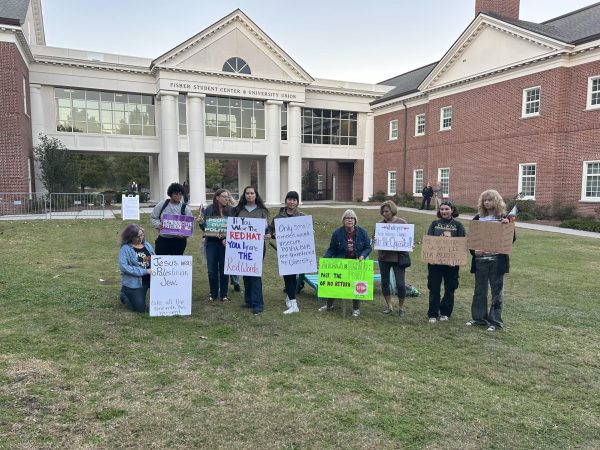
Winnings’ visit to campus raised political and social concerns as several students held a protest at a designated area outside the Fisher Student Union. One of them was Rose Saraiva, a senior majoring in social work.
“They were inviting hate speech onto our campus and saying that the LGBTQ community is ‘eroding our society,’” Saraiva told The Seahawk. “It’s basically saying to our students that they don’t matter, and that they aren’t loved. And we’re out here reminding them that they are loved, and that they do matter.”
“This rhetoric, back-to-back-to-back, with all the [events and tabling] that’s going on, it’s really overwhelming, and people have to come out […] to remind individuals that they are loved and they do have a spot, even though these people are very, very, very loud,” Saraiva said.
Saraiva’s personal values in her own education prompted a deep response to Winnings’ somewhat exclusionary beliefs. “Being a social work major, one of the core social work ethics is standing up for injustice and standing up for systems of oppression and for minorities,” she said. “It doesn’t make sense that I’m learning social work values here on [campus], and the school can’t even abide by them themselves.”
Students like Saraiva feel that the political imbalance on campus has been unfair. “If we are going to be pulling people from the right, then we deserve people from the left. If they get to have their hate amplified, we should have love amplified,” she said.
The protest, albeit small, raised some controversy around campus and was even highlighted in a post later by Winnings on Instagram. A similar demonstration was held outside Kenan Auditorium when Mike Pence gave his Dare to Learn Lecture on Oct. 13.
Since Winnings’ visit, he has posted two videos online of audience members at UNCW that debated him from the audience. One has garnered over 400,000 views.
For more information on freedom of expression at UNCW visit: https://uncw.edu/about/freedom-of-expression/.



